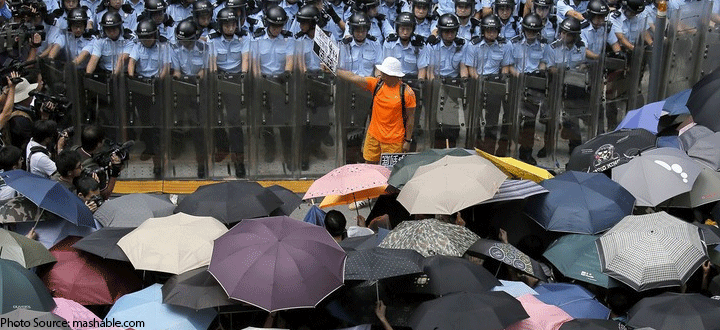In response to last year’s pro-democracy demonstrations in Hong Kong, the Standing Committee of the National People’s Congress proposed an election reform on Sept. 26 that would hand supervision of candidacy to the Chinese government. The public outrage led to massive demonstrations and the mobilization of riot police, whose clashes with the demonstrators led to the coining of the term “Umbrella Revolution.”
The proposed election reform would in effect give political power to China and allow Chinese officials to determine which of the candidates nominated in Hong Kong can run for office. In response to this eventuality, on the evening of Sept. 26, several hundred demonstrators passed a security checkpoint and entered the front of the Central Government Complex. The demonstrators were led by Joshua Wong, founder of a student activist group calling for moral education, known as Scholarism. This illegal breach triggered the government to use tear gas and pepper spray against the student protestors. Scholarism has remained active since May 2011, when it started gathering support against civil nomination, which transfers nomination powers to a regulatory committee.
While Hong Kong remains divided on the issue of election reform, some have called for an end to the demonstrations because they weaken the democratic movement and reflect poorly Democracy Banquet that failed last year. They cite the various international condemnations of demonstrations as well as the low success rate of such demonstrations in China.
Not only do the demonstrations disrupt the peace in Hong Kong, they argue, but the demonstrations also give credence to the sentiment that Hong Kong is politically tied to China. Hong Kong also benefits economically from mainland China since the British left in 1997, and critics of the demonstrations have pointed this out.
“Our economy would have collapsed if they didn’t continue to buy those goods during the SARS crisis,” said Kendrick Lee, a student who lives in Hong Kong who has been adamant about the Umbrella Revolution on social media. “Now, they are chased out by xenophobes. Is this the image we portray? Rowdy, obstructive xenophobes? If we as Hongkongers are so brilliant, why is it us who act in this damaging fashion?”
According to Chris Yeung of The Atlantic, the way the revolution is transpiring violently obscures the real democratic aspirations of Hong Kong’s people, prolonging political restlessness in the city and exacerbating the perennial strains in mainland-Hong Kong relations. Demonstrations continue as of now, and there have been no new developments except for the police retracting riot gear and not using tear gas for the time being.

